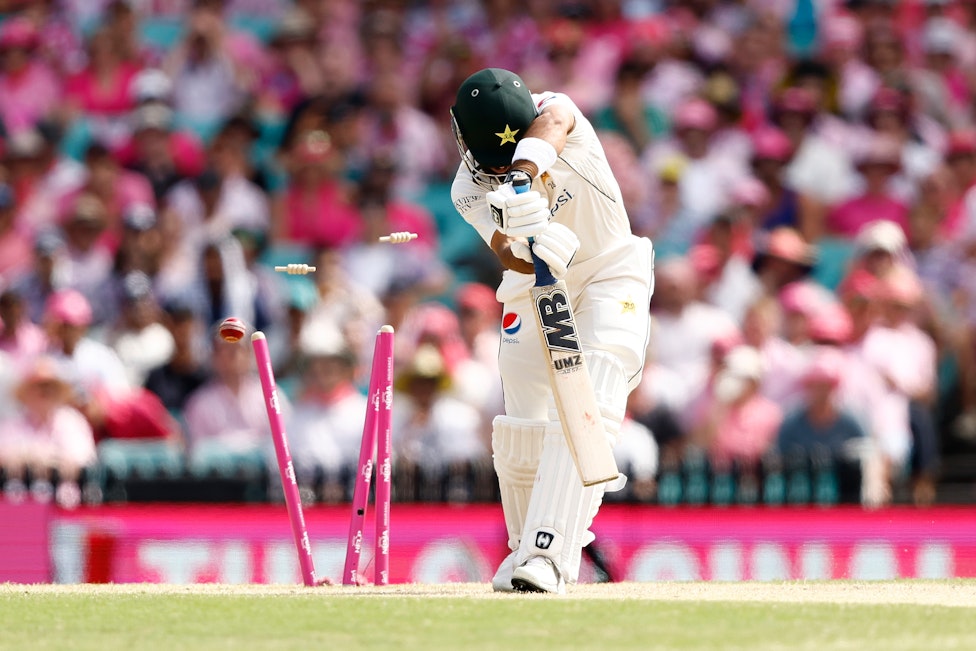 TALKING POINTS
TALKING POINTSPakistan have lost another Test series against Australia Down Under. Going down 0-3, they have extended their losing streak in Australia to 17 Tests. They last defeated Australia in a Test was back in 1995 at SCG. Since then, they have not even managed a draw. A victory remains a farfetched prospect.
What they will rue the most is the chances they missed. Pakistan were in the game in all three Tests but when they collapsed, they went down like dominoes. On the other hand, it wasn’t the perfect series for the hosts either. Known to romp over their opposition at home (barring India), Australia seemed under-par according to the standards they have set at home.
In this space, we look at some major patterns that may define the upcoming assignments of the two sides:
Where are the big scores on Australia’s batting card?
At 37.1, Australia’s top five collectively averaged the second lowest in a home series since Pakistan last toured Down Under in the 2019/20 season. David Warner and Marnus Labuschagne were the only batters in the top five to average above 40. Warner was the only batter to notch up a hundred in the series. Meanwhile, Mitchell Marsh carried the team’s batting fortunes, averaging 86, with two scores of 90s.
The rest just kept wasting good starts. Except one knock of 90, Usman Khawaja had two ducks and three scores in the 40s. Labuschagne had three scores in the 60s with an unbeaten 62 in the run chase at SCG.
But the biggest disappointment was Steve Smith, who averaged only 38.8 at a strike rate of 40 across the six innings. He got a start every single innings, with scores of 31, 45, 26, 50, 38 and 4*.
With Smith, it has been a long term issue now. He scored three hundreds last year but in 13 of his 26 innings since 2023, he has been dismissed between 25 and 71. There are six scores in the 30s. From 2014 to 2022, around 30 percent of his dismissals came in the 31-90 balls range, now gone up to around 50 percent since 2023. There has been no real pattern with his dismissals. Smith has simply found ways to get out against the run of play.
All these players - Khawaja, Labuschagne, and Smith - are known to bat big when they have assessed the conditions. Hence, all three of them failing to notch up a single hundred between them is something to worry about.
Travis Head, at number five, had a series to forget. He managed only 81 runs at an average of 16.2.
What about Pakistan’s batting?
90/7, first innings, Perth
89 all out, second innings, Perth
133/7, first innings, Melbourne
127/8, second innings, Melbourne
96/5, first innings, Sydney
9/5, second innings, Sydney
Pakistan can blame the fluffed chances in this series on their batting. While the bowling kept bringing them into the game, the batting constantly pushed them out of the contest.
Overall, Pakistan averaged only 21.5 runs per wicket. Among Pakistan’s trio of big disappointments were Babar Azam, Abdullah Shafique, and Saud Shakeel.
Taking things in seniority order, Babar averaged only 21 in the three Tests with a highest score of only 41. Before this series, he was never dismissed by Pat Cummins. In this series alone, Cummins pocketed Babar thrice. Also, thrice he was out on balls coming in and beating the inside edge of his bat, hinting at a clear problem in his technique.
Shafique (110 runs in six innings) was out on the front foot on all five dismissals against pace. He was the culprit of hanging his bat outside the stumps. Shakeel (92 runs in six innings) fell to fishing outside the off stump and getting his defense breached multiple times.
Babar came to this series with a Test average of 47.7, Shafique with 50.8 and Shakeel with 81.5. The three of them collectively scored 432 runs at only 24 runs per wicket.
Jamal kept the series competitive
Aamer Jamal in this series was a gift that kept on giving. He came to Australia as a potential Test debutant and ended the series as the highest wicket-taker (18) and the third-most runs for Pakistan (143).
The right-hander picked a 6-for in Perth, five wickets in Melbourne and another 6-wicket haul in Sydney. The next on the list for Pakistan was 10 wickets behind - Shaheen Afridi with only 8 wickets. Jamal has dismissed every Australian batter in this series at least once.
In Sydney, he was solely responsible for Pakistan earning a first innings lead. First, his 82 carried Pakistan from 220/7 to 313. Later, he picked six wickets to keep Australia down to 299. In Melbourne, his 33* carried Pakistan from 170/6 to 264.
Every time Jamal picked up the ball or the bat, he kept Pakistan in the game, that too while playing his debut series in one of the toughest countries to tour. Jamal was the biggest reason a series expected to be one-sided turned out to be vastly competitive. Hence, it was surprising when Pakistan didn’t give him the ball in Sydney until the 20th over while defending only 130.
Pakistan’s catching remains woeful
Pakistan dropped nine catches in the series. Khurram Shahzad dropped Warner on 104. The left-hander went on to add another 59 runs to his score. Overall, the dropped catches in the first two Tests alone cost Pakistan more than 230 runs.
At SCG, Saim Ayub dropped the most straightforward of slip catches that allowed Warner to add another 14 runs to his score. Ayub again spilled Mitchell Marsh’s catch and the Australian all-rounder cashed in, going from 7 to 54. The incessant pattern of dropped catches continued in the second innings as well.
You have got to feel for the Pakistan bowlers. Neither the batters nor the fielders backed their efforts.